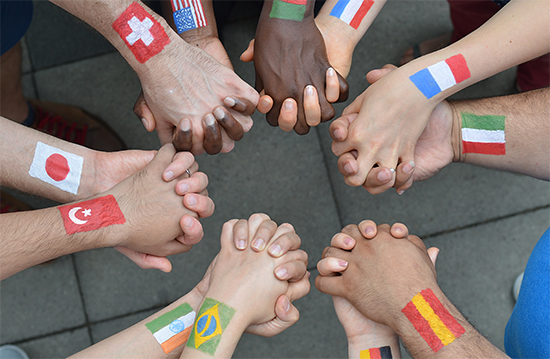
October-
November 2017
The Work Goes On
------------------
|






More Than Numbers
By Clint Morgan
Of the estimated 7.2 billion people alive in the world today, 3.1 billion of them have little or no access to the Gospel of Jesus Christ. What a sobering statistic.
Terminology regarding the social groupings of these 7.2 billion inhabitants of our planet varies. Most mission agencies use the common terms people groups or ethnic groups. Fundamentally the same, both refer to a social grouping of people who share a common language and cultural norms.
What does this have to do with the future of International Misssions?
IM focuses on obedience to Christ’s directive to reach the nations, the Great Commission. Our mission statement affirms this, declaring: “We exist to labor with the Body of Christ to fulfill the Great Commission.” We are all about reaching people with the gospel. To do that, it is imperative to know something about these people groups and grapple with our responsibility to get the good news of salvation to them. But, it is also important to recognize we are talking about individuals—moms and dads, sisters and brothers, aunts and uncles, grandparents, sons and daughters. These are people, not just people groups.
According to Joshua Project, a non-profit Christian research agency, 16,584 distinct people groups populate our world. That is a daunting number, especially when we understand someone has to learn their languages and understand their cultures to present the gospel in that context.
The good news is 9,851 of these groups have viable movements of Christianity among them. Movements large enough to evangelize the whole group—that is, if they are committed to doing so.
However, this also means 6,733 of the 16,584 fall into a category we call unreached people groups. This expression denotes an insufficient number of Christians living among the people group to effectively reach the others. Generally, if less than 2% of the population professes to be Christian, the chances are extremely slim they will be able to change the tide toward Christianity. And yet, we must not forget what happened in the Book of Acts when a small number of committed apostles and believers turned the world upside down (Acts 17:6).
Let’s take this one step further: of the 6,733 unreached people groups, over 3,000 fit into an even more disturbing category. They are unengaged unreached people groups. This means no known church planting effort is going on among them.
I do not want to bore you with too many statistics, but let’s consider one more. Of the 3,000 plus unengaged unreached people groups, 321 have populations of more than 100,000. That means well over 32 million people have little hope of even hearing the gospel.

Many of you know our first mission field, pioneered by Laura Belle Barnard in 1935, was India. Laura Belle Barnard, Volena Wilson, Paul and Nelle Woolsey, Dan and Trula Cronk, and Carlisle and Marie Hanna diligently shared the Word of God, baptized new believers, trained and taught men and women, and established growing churches. Evangelists from India have shared the gospel and birthed Free Will Baptist churches in Nepal and Bhutan. Yet, India alone is home to 2,250 unreached people groups. India, where as many as ten thousand believers gather annually to celebrate their faith as Free Will Baptists, is still only 0.5% evangelical Christian. India is still a vast mission field.
According to one report, 538 evangelical churches exist for every unreached people group. Can we truly justify not making greater efforts in reaching the unreached? Let’s bring it closer home. Worldwide, Free Will Baptists have about 3,500 churches. Is it not reasonable to believe we could—and should—play a significant role in reaching some of these 321 unengaged unreached people groups? Do we not have willing laborers in North America and around the world to engage some of these people groups?
It is up to us to go to God and ask His desire for Free Will Baptists in this matter. Which of these 3,000+ unreached people groups, or 321 unengaged unreached people groups, will He give us the privilege of introducing to the good news?
As a mission agency looking to the future, two extremely important questions lie before us: Where to go? and Who will go? I cannot answer these questions for the denomination, and most certainly not for individuals. But I can say with a great degree of conviction, I believe God knows where to go and who will be sent.
I have confidence God is calling a unique army of “sent ones” to go to the nations. I am equally confident Free Will Baptists from many nations will engage in this spiritual offensive against the gates of Hell.
We are in a new day when we, the home office and missionaries, are no longer solely responsible to strategize, mobilize, and resource our denominational outreach efforts. Several of our former mission fields (e.g. Cuba, Panama, Côte d’Ivoire, Brazil, and others) are seeing believers called to go out as missionaries.
-
The Cuban national church recently presented 13 missionary candidates to the National Association of Cuban FWB Churches. These obedient servants were charged to go to other nations and preach the gospel, make disciples, train leaders, and see churches emerge. These Cuban brothers and sisters have discerned God’s direction for them to go to Uruguay, Angola, Côte d’Ivoire, Haiti, and other places. Their focus? Go to all nations and make disciples.
-
FWB churches in Brazil have sent missionaries to Ireland and Turkey. They are anxiously anticipating, and even expecting, God to call an even greater number to go out. One missionary’s focus: bring hope to Syrian refugees.
-
The National Association of FWB Churches in Côte d’Ivoire, Africa, commissioned a missionary to plant churches in the neighboring country of Ghana. The Ivorian believers are joyfully giving sacrificially to get these willing servants to the field. Their focus? Plant churches among an unreached people group.
-
Our Free Will Baptist churches in Spain commit their moral and prayer support, as well as finances, to support a young Spanish couple working on a team in the southern part of the country. Their focus? Introduce immigrants to a message of compassion and hope.
At International Missions, we are partnering with our international brothers and sisters to labor together to fulfill the Great Commission. My heart’s desire is to see Free Will Baptists around the world join in fasting and prayer to collectively discern the answers to the two questions above. I believe God will make it clear where we are to focus our efforts and direct some gifted believers to take the gospel where His name has never been spoken.
Maybe, just maybe, FWB international teams will be among those privileged to take the message of salvation to five, ten, or maybe even more, of the 321 unengaged unreached people groups. Perhaps it will be a FWB missionary who will take the gospel to that last tongue or nation. And then, the end will come.
Until then we need to be prayerfully, faithfully, and fully engaged in making sure every man, woman, boy, and girl has an opportunity to be filled with the hope of eternal life.
About the Writer: Clint Morgan has been general director of International Missions since 2011. Learn more: www.fwbgo.com.
|
|

